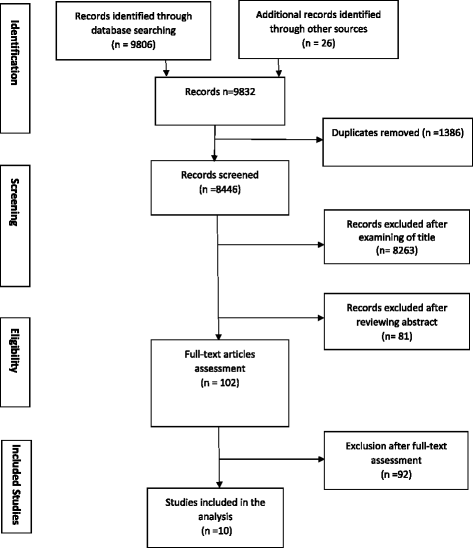Health professionals' views on the barriers and enablers to evidence-based practice for acute stroke care: a systematic review
- PMID: 28583164
- PMCID: PMC5460544
- DOI: 10.1186/s13012-017-0599-3
Health professionals' views on the barriers and enablers to evidence-based practice for acute stroke care: a systematic review
Abstract
Background: Adoption of contemporary evidence-based guidelines for acute stroke management is often delayed due to a range of key enablers and barriers. Recent reviews on such barriers focus mainly on specific acute stroke therapies or generalised stroke care guidelines. This review examined the overall barriers and enablers, as perceived by health professionals which affect how evidence-based practice guidelines (stroke unit care, thrombolysis administration, aspirin usage and decompressive surgery) for acute stroke care are adopted in hospital settings.
Methodology: A systematic search of databases was conducted using MEDLINE, Cumulative Index to Nursing and Allied Health Literature (CINAHL), Embase, PsycINFO, Cochrane Library and AMED (Allied and Complementary Medicine Database from 1990 to 2016. The population of interest included health professionals working clinically or in roles responsible for acute stroke care. There were no restrictions to the study designs. A quality appraisal tool for qualitative studies by the Joanna Briggs Institute and another for quantitative studies by the Centre for Evidence-Based Management were used in the present study. A recent checklist to classify barriers and enablers to health professionals' adherence to evidence-based practice was also used.
Results: Ten studies met the inclusion criteria out of a total of 9832 search results. The main barriers or enablers identified included poor organisational or institutional level support, health professionals' limited skills or competence to use a particular therapy, low level of awareness, familiarity or confidence in the effectiveness of a particular evidence-based therapy, limited medical facilities to support evidence uptake, inadequate peer support among health professionals', complex nature of some stroke care therapies or guidelines and patient level barriers.
Conclusions: Despite considerable evidence supporting various specific therapies for stroke care, uptake of these therapies is compromised by barriers across organisational, patients, guideline interventions and health professionals' domains. As a result, we recommend that future interventions and health policy directions should be informed by these findings in order to optimise uptake of best practice acute stroke care. Further studies from low- to middle-income countries are needed to understand the barriers and enablers in such settings.
Trial registration: The review protocol was registered in the international prospective register of systematic reviews, PROSPERO 2015 (Registration Number: CRD42015023481 ).
Keywords: Acute stroke; Barriers; Enablers; Evidence-based practice; Services; Therapies.
Figures
References
-
- Cochrane A. Effectiveness and efficiency: Random reflections on health services. London: Nuffield Provincial Hospitals Trust; 1972.
-
- Grol R, Wensing M, Eccles M, Davis D. Improving patient care: the implementation of change in health care: John Wiley & Sons; 2013.
-
- Straus S, Tetroe J, Graham ID. Knowledge translation in health care: moving from evidence to practice: John Wiley & Sons; 2013.
-
- World Health Organisation . Research for Universal Health Coverage. Geneva: WHO; 2013.
Publication types
MeSH terms
LinkOut - more resources
Full Text Sources
Other Literature Sources
Medical
Research Materials
Miscellaneous


